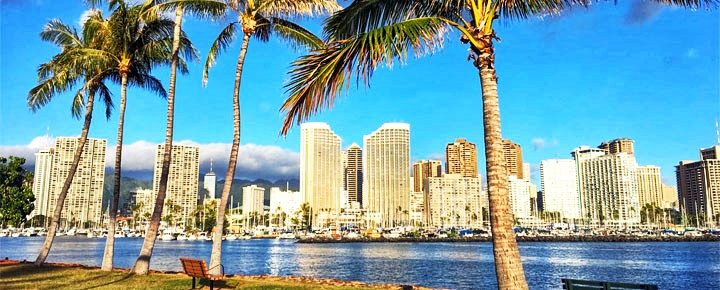Throughout our Hawaii and world travels, we continue to experience vacation rentals in many ways. From approved rentals in vacation zones we always choose to stay in to times in the past in private neighborhoods where the host asked us to keep a low profile. The latter type of rental now gives legal ones a bad rap.
Now Hawaii has given counties (islands) the chance to regulate or eliminate their short-term rentals. Governor Green has made that official by signing Senate Bill 2919 into law this week. Our readers have already voiced their concerns about the potential economic fallout it could bring:
“Think about these numbers (they are conservative). 7,000 units x 40 weeks= 280k visitors. If they each spend 5k on their vacation=$140M into the economy. How will they make up that loss? Tax us local people even more.”
Comment from Maui resident.
“On our recent two-week vacation, our party of ten spent more than $30,000. If we had to stay in a hotel, the total would be $0. We wouldn’t come.”
Hawaii visitor.
“I own an STR (short-term rental). Last year I paid the State of Hawaii approx. $15,000 in TA & GE taxes. I also spent approx. $15,000 in housekeeping and maintenance. Multiply either of these amounts by the 7,000 units… and you get some really big numbers. This impact does not include the reduction in real estate taxes, as properties are no longer taxed at the Vacation Rental rate. Someone hasn’t done the math.”
Short term rental owner.
Governor cautions on legal complexities of new vacation rental law.
As we pointed out yesterday, Governor Green particularly stressed the importance of meticulous legislative drafting to sidestep possible legal challenges and constitutional conflicts. In doing so, he highlighted the intricate legal environment that encompasses vacation rental regulations in Hawaii and beyond.
In that regard, ubiquitous commenter Ernie postured this:
“The Attorneys are sharpening their talons, awaiting the first of many tasty tidbits and lawsuits. Green is assuming that nothing can touch him, but can’t it! Legislating Illegal procedures is interesting, it’s a trail of Evidence leading back to Green. Can we get this fortunate?”
Hawaii vacation rentals in a global context.
Cities and regions everywhere are grappling with the rise of short-term rentals, which, while boosting tourism economies and options, can also put a big strain on local housing markets. In Europe, cities like Barcelona, Amsterdam, and Paris have already implemented strict regulations that include caps on the number of nights a home can be rented out and more. These measures aim to preserve residential housing availability and community integrity. Other communities are poised to join in these efforts.
Widespread U.S. vacation rentals contraction amid legal and constitutionality issues.
As the challenges of regulating short-term rentals become more pronounced in big cities, including New York, as well as smaller travel destinations across the U.S. and elsewhere, there is a grappling with the legendary “Airbnb Effect.” This struggle highlights the economic and social consequences of unchecked short-term rentals, leading to significant regulatory pushback.
Last year New York City introduced robust measures to regulate Airbnb and similar platforms. With more than 25k listings at the time, the city faced increasing pressure from those who argued that vacation rentals were exacerbating high rents and eroding neighborhoods.
New regulations there required vacation rental operators to be primary homeowners, present during the rental period, and more. These rules aimed to eliminate about 90% of active listings, in a decisive stance to preserve residential spaces for locals rather than tourists.
The new regulations in New York mirror actions in smaller communities like Durango and Bozeman, both of which have adopted approaches to control their markets. In Lake Tahoe, the rising popularity of vacation rentals prompted local governments to act.
Last year, the California Court of Appeal upheld South Lake Tahoe’s Measure T, which restricts vacation rentals in residential areas, which was passed by a narrow margin in 2018. While the court’s decision confirmed the city’s authority, it noted potential constitutional concerns regarding the treatment of out-of-state property owners, pinpointing both legal issues and ongoing tensions about property rights and community welfare in tourist-heavy destinations.
The international vacation rental scene.
From Barcelona to Florence, European cities have also experienced significant housing cost increases attributed to the proliferation of vacation rentals, similarly prompting strict regulatory responses. Florence recently implemented a complete ban on new vacation rentals in its historic center, for example.
Economic and social ramifications in Hawaii and beyond.
The growth of vacation rentals has led to what critics and commenters here describe as economic exploitation, where speculators buy properties for vacation rentals, squeezing out residents. This has led to increased housing costs and a decrease in available housing for residents, which is particularly acute in vacation hotspots like Hawaii as well as other popular destinations.
The regulation of vacation rentals has and will continue to result in legal battles. Issues include the clash between homeowners’ rights to rent out their properties and community efforts to regulate or eliminate such rentals to maintain neighborhoods and housing stock.
The future of vacation rental regulation.
It seems likely that the future will involve a nuanced balance in tourism economies like Hawaii. As seen in the US and around the world, successful regulation requires careful legal and constitutionality considerations. Hopefully Hawaii will be helped by other areas that have enacted or are contemplating similar regulations with sage guidance on avoiding legal pitfalls while effectively managing the impacts of short-term rentals.
Please let us know where you see the future of Hawaii vacation rentals heading.







Live in Victoria, British Columbia, Provincial Government has cracked down on STR this year due to our housing crisis. This apparently is a global issue for most tourism driven economies.
Very good point Mike that this is not addressing the problem that they’ve claimed is the problem, illegal STRs that they somehow are aware exist in neighborhoods, thousands according to the governor – but then the County can’t find and shut down and return housing for residential purposes??
It is definitely a value extraction scheme – force a reduction in the value and the income for landlords to make them sell at a greatly reduced price.
Who are the intended beneficiaries of this scheme? So many options… could be the locals but probably not. Locals were likely not at the real closed door planning sessions.
There were 1000s of illegal STRs shut down. They recently made it where they can be reported anonymously. It was hard for some neighbors to report this with their name attached. However I don’t believe they’ve let everyone know they report these illegals anonymously. Wish there was a way to spread the word. Neighborhoods are where these families need to live.
If Maui was actually attempting to stop rentals in residential areas, it would make sense, but that isn’t what is happening. Maui is trying to shut down purpose built resort communities that were never intended to be, and will never be, residential. This law will lower the price of condos in these areas, but not to a point to justify long-term rentals.
Green and Bissen have gone too far. If they can’t be reigned in by the courts, especially shortsighted Bissen and all his gloating constituents, should and hopefully will be voted out of office.
Wondering how this new legislation will be effecting timeshare owners. Will they claim emminent domain and force the sale of the timeshares? I don’t want to sell!! Love my timeshare and the wonderful memories made there.
Timeshares are owned by big corporations, such as Marriott. You don’t actually own the property. They sold you the right to use it for a week or two every year. Just like no one can take away the hotel room you paid for, no one will take your timeshare away.
Keoki, I do not have points tho. I have deeded property on Maui. The timeshare world went to points but mine is not. They would have to buy me out.
If timeshare is deeded ownership weeks and not a Club or just points, it is ownership. It is an undivided interest. If owned by a hotel corp you are safe. If deeded timeshare you are safe.
You’ll still be able to stay there. Hotels and timeshare will basically be the only employment we will be able to count on until this gets overturned.
A few questions about the delayed moratorium in Wailea, for those who know more than I do: It seems that most who have lost homes in Lahaina don’t want to live in Wailea. I believe over 300 offered their condos in our area through the FEMA program without takers. This does not get publicized. Also, a typical 2 bedroom cost $2M plus $2000/mo in HOA fees. How would this help in terms of affordable housing? Finally, many condos in Wailea were built for the purpose of renting as STRs. The Palms and Wailea Palms were twin developments in 1992, one for STRs and one for long term rentals. How does that make The Palms “work force housing?”
Many of those questions apply in West Maui as well. The Eldorado was purpose-built as a resort. Many others as well. Plus Kapalua Golf Villas are on the list, but to be economically viable as a long term rental, they would have to charge $15,000 or more per month. They will sell to people willing to let them sit empty most of the year long before they get cheap enough to make a $2500/month rental viable.
I agree what is so difficult about grandfathering in, and putting caps on certain areas? It’s not all or nothing.
We have been coming to Hawaii for 3 months each year for the last 20 years.
We spend approximately $80,000 each year. Don’t bother anyone, have made lots of local friends, enjoy the warm weather in our retirement
Hate to loose it. Good luck to all the great markets, restaurants, golf courses, at least the whales won’t be bothered with whale watching boats
Mahalo
Not sure about the previous calculation, I think way low. Our condo in 2023 had $70,000gross receipts. Fixed and variable expenses $60,000 including 17% local taxes 22% property management, $9,500 HOA $8,500 property tax, $2500 utilities, $1,000 insurance and maintenance. Guess the net was $10,000. Ok our guests put $60,000 into the Maui economy, for lodging only. 7,000 units at 80% occupancy is 5600 units rented using my average is $336,000,000 (336 million). About 26 million in airfare. $330 million for spending average $200 a day, 81 million in car rentals. This is if you take 7,000 STR’s out of the pool. Bite that apple. Oh and for our help we netted $10,000!
Hawaii’s bread and butter is tourism. While more major cities around the world have other forms of business to survive. The level of incompentency in this goverment is ridiculous. Tourism is all this State has to survive. That’s it. Exporting pineapples is not going to cut it.
Excellent article. The only way I could afford to come back for my high school reunion with 10 in our ohana was to rent a house far away from my school and Honolulu. Hotel accommodations were financially out of the question. It will be several years before I want to take family back there until this rental issue is resolved. Mahalo.
“Nuanced” is a great take. It’ll take a few lawsuits to get there. In the meantime we just returned from a trip overseas. A year ago we Never would have thought to go anywhere but Maui. We had so much fun we are already planning next year’s return. We didn’t miss Maui like we thought we would! Hawaii will have to wait. We are late bloomers as Japanese tourists discovered this a while back. Green must be thrilled.